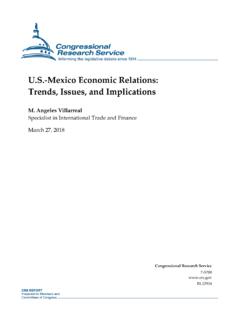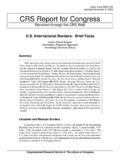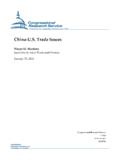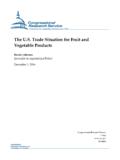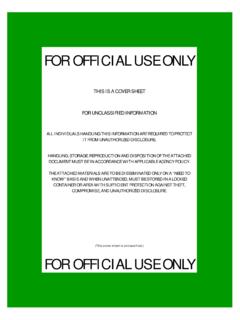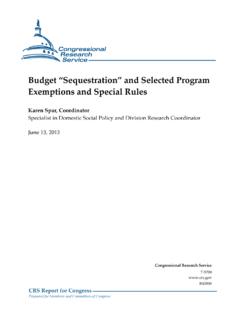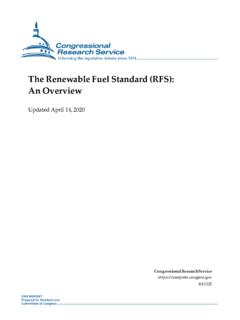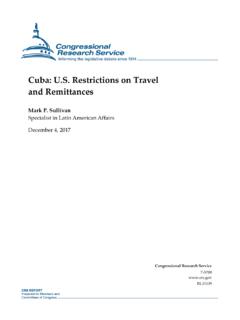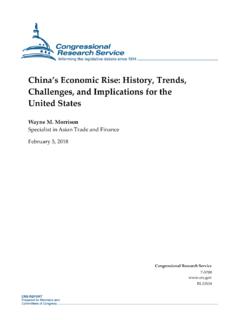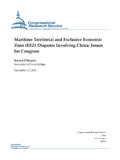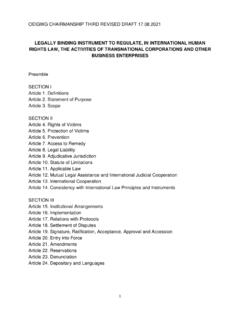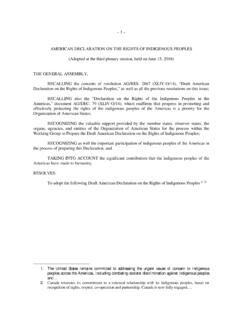Transcription of International Law and Agreements: Their Effect upon U.S. Law
1 International Law and Agreements: Their Effect upon Law Stephen P. Mulligan Legislative Attorney Updated September 19, 2018 congressional research Service 7-5700 RL32528 International Law and Agreements: Their Effect upon Law congressional research Service Summary International law is derived from two primary sources International agreements and customary practice. Under the legal system, International agreements can be entered into by means of a treaty or an executive agreement. The Constitution allocates primary responsibility for entering into such agreements to the executive branch, but Congress also plays an essential role.
2 First, in order for a treaty (but not an executive agreement) to become binding upon the United States, the Senate must provide its advice and consent to treaty ratification by a two-thirds majority. Secondly, Congress may authorize congressional -executive agreements. Thirdly, many treaties and executive agreements are not self-executing, meaning that implementing legislation is required to render the agreement s provisions judicially enforceable in the United States. The status of an International agreement within the United States depends on a variety of factors. Self-executing treaties have a status equal to federal statute, superior to state law, and inferior to the Constitution.
3 Depending upon the nature of executive agreements, they may or may not have a status equal to federal statute. In any case, self-executing executive agreements have a status that is superior to state law and inferior to the Constitution. Courts generally have understood treaties and executive agreements that are not self-executing generally to have limited status domestically; rather, the legislation or regulations implementing these agreements are controlling. In addition to legally binding agreements, the executive branch also regularly makes nonlegal agreements (sometimes described as political agreements ) with foreign entities.
4 The formality, specificity, and intended duration of such commitments may vary considerably, but they do not modify existing legal authorities or obligations, which remain controlling under both domestic and International law. Nonetheless, such commitments may carry significant moral and political weight for the United States and other parties. Unlike in the case of legal agreements, current federal law does not provide any general applicable requirements that the executive branch notify Congress when it enters a political agreement on behalf of the United States. The effects of the second source of International law, customary International practice, upon the United States are more ambiguous.
5 While there is some Supreme Court jurisprudence finding that customary International law is part of law, domestic statutes that conflict with customary rules remain controlling, and scholars debate whether the Supreme Court s International law jurisprudence still applies in the modern era. Some domestic statutes directly incorporate customary International law, and therefore invite courts to interpret and apply customary International law in the domestic legal system. The Alien Tort Statute, for example, which establishes federal court jurisdiction over certain tort claims brought by aliens for violations of the law of nations.
6 Although the United States has long understood International legal commitments to be binding both internationally and domestically, the relationship between International law and the legal system implicates complex legal dynamics. Because the legislative branch possesses important powers to shape and define the United States International obligations, Congress is likely to continue to play a critical role in shaping the role of International law in the legal system in the future. International Law and Agreements: Their Effect upon Law congressional research Service Contents Introduction.
7 1 Forms of International Agreements .. 2 Treaties .. 3 Executive Agreements .. 6 Types of Executive Agreements .. 6 Mixed Sources of Authority for Executive Agreements .. 8 Choosing Between a treaty and an Executive Agreement .. 9 Nonlegal Agreements .. 12 Effects of International Agreements on Law .. 15 Self-Executing vs. Non-Self-Executing Agreements .. 15 congressional Implementation of International Agreements .. 17 Conflict with Existing Laws .. 20 Interpreting International Agreements .. 21 Withdrawal from International Agreements .. 23 Withdrawal from Executive Agreements and Political Commitments.
8 23 Withdrawal from Treaties .. 25 Customary International Law .. 28 Relationship Between Customary International Law and Domestic 29 Statutory Incorporation of Customary International and the Alien Tort Statute .. 31 Conclusion .. 32 Figures Figure A-1. Steps in the Making of a treaty .. 33 Figure A-2. Steps in the Making of an Executive Agreement .. 35 Appendixes Appendix. Steps in the Making of a treaty and in the Making of an Executive Agreement .. 33 Contacts Author Contact Information .. 36 Acknowledgments .. 36 International Law and Agreements: Their Effect upon Law congressional research Service RL32528 VERSION 18 UPDATED 1 Introduction International law consists of rules and principles of general application dealing with the conduct of states and of International organizations and with Their relations inter se, as well as with some of Their relations with persons, whether natural or juridical.
9 1 While the United States has long understood International legal commitments to be binding upon it both internationally and domestically since its inception,2 the role of International law in the legal system often implicates complex legal The United States assumes International obligations most frequently when it makes agreements with other nations or International bodies that are intended to be legally binding upon the parties Such legal agreements are made through treaty or executive The Constitution allocates primary responsibility for such agreements to the executive branch, but Congress also plays an essential role.
10 First, in order for a treaty (but not an executive agreement) to become binding upon the United States, the Senate must provide its advice and consent to treaty ratification by a two-thirds Secondly, Congress may authorize executive Thirdly, the provisions of many treaties and executive agreements may require implementing legislation in order to be judicial enforceable in 1 RESTATEMENT (THIRD) OF FOREIGN RELATIONS LAW OF THE UNITED STATES, 101 (1987) [hereinafter THIRD RESTATEMENT]. Recorded International law dates back to agreements between Mesopotamian rulers five thousand years ago, but International law as it now commonly understood began with the Roman Empire, whose scholars formulated a jus gentium (law of nations) they believed universally derivable through reason.
